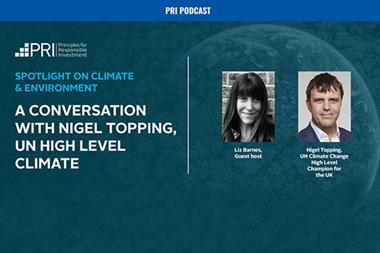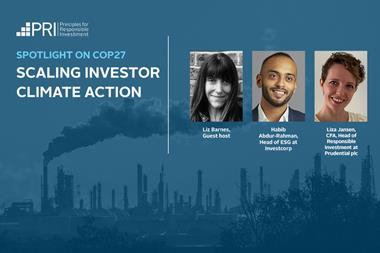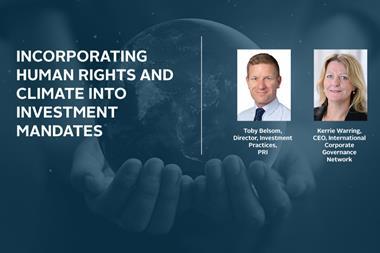Spotlight on COP26: from Glasgow to action
With Fiona Reynolds, PRI CEO and Liz Barnes, journalist
Note: The Principles for Responsible Investment podcast is designed to be heard. If you are unable to do this, this transcript offers an insight into the episode.
Transcripts are generated using a combination of speech recognition software and human transcribers, and may contain the occasional error. Please check the corresponding audio before quoting in print.
Subscribe to the channel via Apple podcasts, Spotify, or wherever you listen to your podcasts.
Liz Barnes
Hello and welcome to the PRI podcast, and the second in our spotlight episodes around COP26. My name is Liz Barnes and I’m delighted to be your host for this special episode.
All eyes have been on Glasgow for the past few weeks as the world watched to see how seriously committed countries and the private sectors are to delivering on the Paris Agreement.
And we are in a serious situation on climate: you only need to turn on the news and see reports of lethal storms, heatwaves and floods in recent weeks and months to know that the danger of climate change is no longer a theoretical future, but a fact we can’t ignore. As Antonio Guterres, Secretary-General of the UN has said, “the alarm bells are deafening”.
Against this backdrop, the PRI was at the conference, convening actors across the financial sector to collaborate on implementing ambitious climate action plans, including targets in line with 1.5°C warming goals agreed on in the Paris Agreement.
In this episode, I’m joined by the PRI CEO Fiona Reynolds. We’ll be taking stock of the conference, looking at some of the key takeaways from COP26, and discussing what needs to be done next.
Liz Barnes
Welcome Fiona!
Fiona Reynolds
Hi Liz!
Liz Barnes
First, I guess the best place to start is the stocktake of what has been achieved at COP26. In our pre-COP episode, securing net zero by mid-century and keeping 1.5c on the table and within reach was a key expectation ahead of the conference. At the eve of COP26, there were some key government commitments to keep 1.5 alive. I want to just summarise some of them now. There were pledges on deforestation, weren’t there?
Fiona Reynolds
There was - the commitment to halt and reverse deforestation globally by 2030 was one of the first important announcements out of the conference. The countries involved in the pledge are home to 85% of the world forests, and this declaration on forests backed by £14 bn of public and private money to mainly protect the Amazon, the tropical forests of Indonesia and the Congo Basin.
As we know, around a quarter of global emissions come from changes in land use. And reversing trends on the historic loss of forest cover and shifting to afforestation is one of the key large-scale options for negative emissions, as well as being essential to the net-zero transition. So, the pledge to halt and reverse deforestation shows that investing in nature and resilience is a necessity for a net zero economy.
In addition to this, the Global Methane Pledge constitutes another major announcement, with approximately 100 countries committing to cutting methane emissions by 30% by 2030.
Liz Barnes
Now for many, fossil fuels are at the forefront of the debate, aren’t they? What are some of the key takeaways regarding fossil fuel financing?
Fiona Reynolds
Well, a series of announcements were made regarding fossil fuel financing. Namely, more than 40 countries are committing to ending overseas investment in coal. This includes major coal-using countries such as Poland, Vietnam, and Chile. Though, the biggest coal-dependent countries like Australia, India, China, and the US didn’t sign up to the pledge.
The Glasgow Climate Pact, which details the agreement reached by the Parties, now includes a line on coal for the first time. So that shouldn’t be underestimated. Although, the last-minute intervention from India watered down on adopting the language of “phasing down” instead of “phasing out” of coal produced without the use of technology to capture the emitted carbon, or unabated coal. However, it nevertheless sends a strong message to domestic policy makers and the market on coal and I believe this will set out deep acceleration of coal phaseout in the coming years.
So, while both of these key announcements on fossil fuel sets the tune for far-reaching systemic changes, we still need to go further. So PRI is really calling for all G20 members to set a clear timeline for comprehensive and equitable phaseout of all fossil fuel subsidies by 2022, and this includes subsidies for exploration and production, and public finance.
On the flip side, phasing out fossil fuel and subsidies should lead to the replacement of fossil fuels with renewable energy solutions and the electrification of existing services, including transport and buildings, in order to keep a 1.5c outcome really alive. In fact, the latest analysis from Transition Zero shows that the world must close 3,000 coal units by 2030 to hit the 1.5c target. Put that in perspective, that’s around one unit per day.
Liz Barnes
So, that sounds as though that’s all really welcome and incredibly needed as well – but how will these things actually be enforced?
Fiona Reynolds
That’s a good question. So transparency and granularity in the list of policies and goals to meet these announced pledges are really critical. And that remains to be seen. So, while we’ve made strides towards keeping 1.5 on the table, we need to remain cautious, and we need to not take any steps back.
So, the Nationally Determined Contributions (NDCs), even if fully implemented, still leave a significant gap to 1.5c and this is somewhere between 1.8c to 2.5c depending on the underlying methodology.
So, the number of pledges and catchiness of their names won’t take us far, real actions and accountability are what truly lowers global warming and protects us all from the worst of the crisis. We need to see actions taken further and faster. We need to go beyond words and beyond pledges and we definitely need to see them in action.
Liz Barnes
What about commitments from high-emitting countries? We had expectations for China and the US in particular, didn’t we?
Fiona Reynolds
We did President Xi Jinping did not show up physically at COP, instead, he gave a written statement via the state media. Days before the Conference, China updated its NDC, but it left its commitment to peak emissions before 2030 unchanged and it’s been unchanged since 2014. And given that China accounts for 30% of global emissions, it really matters how much before 2030 Chinese emissions peak and then how quickly annual emissions fall thereafter. So, in September, Xi pledged to end overseas financing for coal-fired power plants, this was an important and welcome announcement, but we have yet to see a similar announcement for China’s domestic coal usage.
The US and China had been really caught in a finger-pointing match during the first week of COP. But during the second week, this tension eased a bit as the two countries released the US-China joint declaration. This is a positive development that allowed COP26 to create new hooks for policy tightening between the world’s two biggest emitters. I think it was really welcomed at COP and it was a turning point.
So, President Biden’s efforts to re-join the High Ambition Coalition with the goal of achieving no more than 1.5c of warming must be matched with greater progress in domestic decarbonisation as well. Yet, oppositions and objections from Senator Joe Manchin have largely halted America’s momentum towards reaching its climate goals. So you know, a lot came out of China and the US but we need to see a lot more.
Liz Barnes
Let’s look at other countries, what were their commitments? What about India, for example?
Fiona Reynolds
So, India’s announcement of net zero by 2070 was the biggest news of day 1 at COP. Net Zero announcements are welcomed, but the long timeframe for its realisation would not put the world on track for 1.5c.
Liz Barnes
Fiona, you’re originally from Australia, you must keep a really close eye on what’s happening there?
Fiona Reynolds
I do, and usually with a lot of despair. So, Australia made its long-awaited 2050 by net zero commitment, but details really remain elusive. Its current plan to continue exporting coal and gas after 2050 can only significantly undermine global ambition to keep temperature increases held at 1.5c.
Climate policy is increasingly being embedded in global trade and economic relations. So, delays in action, pinning emissions reductions in Australia on post-2030 on costly new technologies and continuing reliance on coal and gas will only reinforce investor concerns of longer-term volatility, structural economic risks and higher subsequent adjustment costs.
So overall, our expectation remains the same – long term pledges must be met with near-term accountability. And countries need to follow science-based evidence in policymaking. President Biden said “none of us can escape the worst of what’s yet to come if we fail to seize the moment” - which is very true. Seizing this moment means deploying concerted, real-world action. And I think that Australia has really failed in that regard and needs to step up its 2030 commitments.
Liz Barnes
And of course, this year, finance has been in the spotlight, with day three of the event dedicated to mobilising public and private capital towards global climate finance. Now, what were some of the big movements from the private sector?
Fiona Reynolds
What needs to be emphasised here is that finance is becoming a major vehicle for the delivery of ambitious climate actions in line with what the world is demanding. And at the beginning of the conference, the pledge from world leaders to end deforestation by 2030 was backed by public and private funds. So, more than 30 of the world’s largest financial companies, including Aviva, Schroders and AXA, have committed to ending investment in activities linked to deforestation. And it’s worth noting that a previous deal in 2014 on ending deforestation did not end in success, so this new commitment needs to be delivered on.
On Finance Day, Mark Carney delivered a progress report on GFANZ, the Glasgow Financial Alliance for Net Zero, with a staggering $130 tn of global AUM now committed in line with net zero targets.
So these growing net zero commitments announced at COP26 are really welcome, but it is critical to remember that these commitments are only step 1 towards realising systemic change. They are a sign of institutional intent but they must be translated into action. Having said that though, I would really say that finance, the private sector at this COP was front and centre and it played a much bigger role, more than it has in the past and I think that its very much that the governments realise that without the private sector, we’re simply just not going to resolve the climate problem. So it was really good to see the coming together of the public and private sector.
Liz Barnes
That all sounds really encouraging. What about on the regulation front? Were they any developments there?
Fiona Reynolds
There were. In terms of regulations and standards, the IFRS Foundation has announced the formation of a new International Sustainability Standards Board (ISSB) – as I say we need more acronyms in the finance world. It is a comprehensive global baseline of high-quality disclosure standards, which can be used as standalone requirements, or leveraged in jurisdiction’s policymaking to add ambition. So as such, PRI calls on jurisdictions to collaborate and build a truly global baseline of corporate sustainability reporting, which extends its scope from material climate-related risks and opportunities to wider sustainability issues, including an outcomes perspective over time. At the end of the day, investors have been calling for a long period of time for meaningful, comparable information, standards data about climate and other sustainability issues. And this is a step we’ve been looking forward to, a step in the right direction.
Liz Barnes
So based on that and on everything that we have already touch - overall, how would you evaluate the outcome of COP26? Would you class it a success?
Fiona Reynolds
Well, I do really think that COP26 has made progress in tackling climate change, but as it stands this is an incomplete victory. Specifically, the Glasgow Climate Pact has created new hooks for accelerating policy in the early 2020s, but it is not yet a breakthrough in efforts to limit climate change to 1.5c. It is vital that nations now come back to the negotiating table next year on issues such as NDCs. Bringing forward the timetable to the end of 2022 really is a key achievement of the summit. Every year matters.
As mentioned, we’ve made commendable progress in the form of pledges, particularly in relation to overseas coal, deforestation, and finance mobilisation, both public and private. Biodiversity, nature, and nature-based solutions were all front and centre in major announcements. And they are symbolic of the structural, systemic changes we need in order to avoid the worst of the climate crisis. The collaboration between the investment community, the business community, and governments were much more on display at this COP26, and the array of net zero commitments really shows a positive step forward.
The importance of private finance was emphasised this COP, and from PRI’s perspective, we want this to be a call to rise to the challenge for investors and truly commit themselves to be Paris-aligned. Decarbonisation needs to be visible on the balance sheets. The emissions gap to 1.5c highlights the disconnect between the long term pledges and short-term targets, and nations and businesses need to go further, faster on their commitments. SO overall, I would say – that it was good but not good enough.
Liz Barnes
We have heard so much about 1.5c at COP 26 and indeed during our chat today - what do we need to do to continue keeping 1.5 on the table?
Fiona Reynolds
Well many of these high figures are commendable, but we cannot lose sight of the necessity of high quality and integrity of the promises and pledges made by financial institutions and governments. High-level pledges should be matched by a high level of implementation. We need our governments, in particular G20 governments, to continue to increase the robustness of their net zero pledges and back them up with near-term actions. Some nations, such as Saudia Arabia and Australia, continue to drag their feet on a number of issues, which place the world beyond the timeframes needed for action to be taken. So, the PRI’s Investible Policy Response highlights eight key policy levers governments should focus on as well setting out the Required Policy Scenario for us to reach 1.5c. But 1.5c is what we need to get to before we reach catastrophic climate change. We are not there yet.
Liz Barnes
Coming out of this COP, what should investors do to continue and extend the momentum, and translate these Glasgow pledges into real action?
Fiona Reynolds
So the Glasgow breakthroughs are a strong example of good real-economy impact. So they focus on direct, measurable action taken on a sector-by-sector basis provides a helpful blueprint for net zero, as well as delivering strong economic benefit. These two factors should remain at the forefront in the mind of investors.
First, we’re really encouraging investors to set science-based net zero targets with near-term accountability, including interim targets. So not just 2050 but interim targets. We need to combine credibility and impact to reach these goals. There are also a number of initiatives that investors can join to increase accountability on their commitments:
SO the PRI is involved in the NZAOA and we recently produced a progress report with 29 five-year targets, so this is for 2025. These are the most ambitious net zero targets to include a commitment to reduce portfolio emissions by 25-30% by 2025 across three asset classes. And then there’s also the NZAM and they also released 2030 interim targets published prior to COP from a number of members. So there’s a lot of progress happening in the progress sector, but we need to make sure that people set targets but actually report against these targets and that they are transparent so we can see what progress is being made.
Liz Barnes
Of course, it’ll be key for net zero targets to be paired with effective stewardship, policy engagement and tools to ensure they have impact in the real economy. How can we make that happen?
Fiona Reynolds
Well in the investment community, we have Climate Action 100+. It’s the largest meaningful collaborative stewardship initiative to drive meaningful progress on climate goals, with over 500 investors, 50 trn AUM. This includes asking companies to align with the CA100+ Net Zero Company Benchmark, if you’re interested in that, there’s a link in the episode description. This has been a really successful collaboration between investors and I think its had a really meaningful impact on setting net zero targets for investors.
Liz Barnes
Of course, investors need to take a holistic approach to climate and recognise that deforestation and a just transition are systemic risks integrated into climate strategies. What should investors keep in mind on the just transition?
Fiona Reynolds
Well on the just transition, this includes ensuring that the transition plans away from fossil fuels, integrates human rights considerations, with climate solutions respecting affected communities and workers’ rights, and equitable access to energy is duly taken into account. We need to see more investor action on Just Transition across different investor levers, from stewardship activities to policy engagement and asset allocation. We need more place-based initiatives and more collaboration with other actors including governments and other entities in the finance sector.
One step that could be taken to support developing nations is improved identification of infrastructure needs. So governments and investors need to know what infrastructure projects are required to help the transition to net zero, and the mechanisms to fund them need to be simplified. There money is there, but more clarity is needed. But at the end of the day, if we transition to lower carbon economy, there are going to be people who are going to be displaced from their jobs, people who rely on fossil fuels – we can’t leave them behind. We need to make sure that they are part of the plan.
Liz Barnes
And on deforestation?
Fiona Reynolds
Well, deforestation is a systemic risk and every investor and company need to address it - its impacts are cumulative and irreversible. So active ownership demands immediate and collective action for the changes in the real economy that we need. PRI and its signatories are committed to establishing a pathway that will enable us to be accountable for and to manage this risk. We really need to be thinking more about the whole issue deforestation and nature based solutions, we won’t get to net zero by just thinking about emissions reductions from the largest emitting companies, we need to think about biodiversity issues as well, particularly deforestation.
Liz Barnes
Fiona, before we go, I want to ask you a final question: what one thing personally do you hope to see out of COP26?
Fiona Reynolds
Well, I really hope to see that the commitments and pledges that are made are turned into action. And anyone who needs to lift their game, comes back next year with a much higher ambition target
Liz Barnes
Fiona, thank you for your insights and expertise. Don’t forget you can access all the resources we discussed in the episode description. And do stay tuned for our next PRI podcast on municipal bonds, which will be released next week.
Liz Barnes
Once again, thanks Fiona.
Fiona Reynolds
Thanks Liz.
Liz Barnes
And remember, if you liked this episode, please do rate and subscribe. And if you’d like more information about responsible investment, go to unpri.org.
Interested in the resources discussed in this episode?
UN-convened Net-Zero Asset Owner Alliance
Net Zero Asset Managers Initiative
Downloads
Transcript: Spotlight on COP26: from Glasgow to action
PDF, Size 0.23 mb



















